the UCLA Chicano Studies Research Center,
the Arhoolie Foundation,
and the UCLA Digital Library
No country has a canon of Christmas carols to rival the United States. Seasonal chestnuts such as “White Christmas,” written in 1942 by Irving Berlin, and “Jingle Bells,” penned by James Pierpont in a Massachusetts tavern in 1850, are among the most popular Christmas songs on the planet.
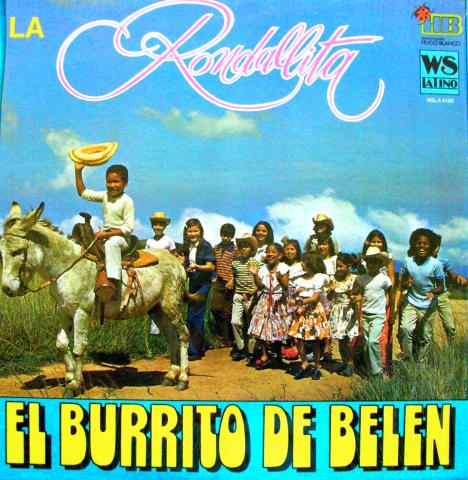 But Latin America also has a strong musical repertoire for Christmas celebrations. Some stick strictly to religious themes, such as the Nativity songs of Las Posadas, the Mexican tradition that recreates the Holy Family’s search for lodging. Others also celebrate more earthly themes: Puerto Rican aguinaldos, for example, often sing the praises of lechón, the roasted pork that replaces turkey in Caribbean and Filipino yuletide meals.
But Latin America also has a strong musical repertoire for Christmas celebrations. Some stick strictly to religious themes, such as the Nativity songs of Las Posadas, the Mexican tradition that recreates the Holy Family’s search for lodging. Others also celebrate more earthly themes: Puerto Rican aguinaldos, for example, often sing the praises of lechón, the roasted pork that replaces turkey in Caribbean and Filipino yuletide meals.
As a category of music, Christmas tunes are entirely incidental to the Frontera Collection. Still, there are sufficient examples to provide a taste of the Christmas spirit, Latin style. Here are a variety of celebratory selections, from solemn hymns to “Jingle Bells” with a salsa beat.
Las Posadas
Las Posadas is a festive community celebration featuring a door-to-door procession through neighborhoods, re-enacting the story of Christmas through song. The celebration lasts for nine nights, dramatizing the futile search for lodging after Joseph and the pregnant Mary arrive in Bethlehem and find no room at an inn (“posada” in Spanish). Traditionally, families take turns posing as innkeepers at their homes, turning away the pilgrims, or peregrinos, who carry candles and paper lanterns and pretend to look for a place to stay.
The ritual of looking for lodging, and the refusal, is played out in various verses, sung by each side in the re-enactments. Finally, on the night of December 24, at the final stop, the homeless Holy Family is allowed in. Then everybody partakes in a party with a piñata for the children and a Christmas feast with tamales, buñuelos and a seasonal fruit drink called ponche.
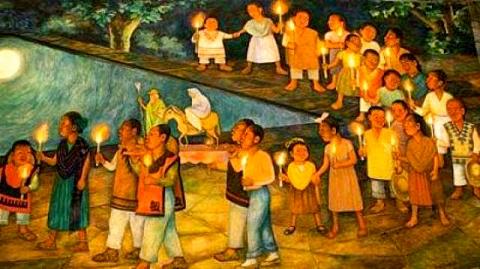 The archive contains a dozen songs with “posadas” in the title, but none with the full traditional lyrics, at least none that have active audio tracks. There’s an instrumental on a Bluebird 78 by Alfonso y Su Orquesta that keeps close to the melody, and another recording by Pepe Luis and His Orchestra on Seeco Records that uses only snippets of the traditional melody in what is otherwise a pretty standard cha cha cha. For a more comprehensive collection of Latin American Christmas songs, check out the album Cantos de Las Posadas and Other Christmas Songs on the Folkways label.
The archive contains a dozen songs with “posadas” in the title, but none with the full traditional lyrics, at least none that have active audio tracks. There’s an instrumental on a Bluebird 78 by Alfonso y Su Orquesta that keeps close to the melody, and another recording by Pepe Luis and His Orchestra on Seeco Records that uses only snippets of the traditional melody in what is otherwise a pretty standard cha cha cha. For a more comprehensive collection of Latin American Christmas songs, check out the album Cantos de Las Posadas and Other Christmas Songs on the Folkways label.
On the other hand, the collection does hold several novelty and parody songs, some by major artists, which play upon the posadas theme.
“Las Posadas,” Parts 1& 2, Trovadores Tamaulipecos (Columbia 3690X)
This two-part 78 recording is fascinating, with multiple parts and stylistic changes. It has elements of traditional posadas, but also vaudeville comedy skits and segments that echo the Gregorian chants of the Catholic mass. The composers are José Agustín Ramirez and Lorenzo Barcelata, founding members of the popular group from the 1930s. The label lists the genre as “corrido,” yet the song is everything but.
“Las Posadas de Tin Tan,” Tin Tan y Marcelo (Columbia 6308-X)
Popular Mexican actor and comedian Tin Tan recorded this posadas parody, along with a comedy sidekick. The faithful will find it disrespectful, and anybody with a sense of humor will find this attempt at holy humor falls flat. The accompaniment is by the respected Mariachi Oro y Plata De José Chávez, in addition to a conjunto.
“Las Posadas,” Lalo Guerrero (Colonial 453)
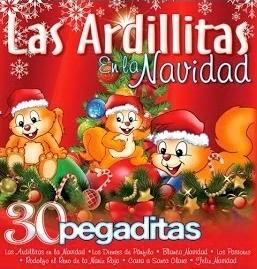 Singer-songwriter Lalo Guerrero, known as the father of Chicano music, has more success with his own humorous take on the tradition. Backed by L.A.’s famed Mariachi Los Camperos, Guerrero playfully rewrites the Christmas classic with references to tequila, girls, drunks, and mariachis. Along the way, he slyly incorporates snatches of Mexican standards such as “La Bamba” and “La Raspa.” The Father of Chicano Music, as he is known, offers another novelty version of the Christmas song, but this one featuring Las Ardillitas, his version of the squeaky-voiced children’s act, The Chipmunks. Adults may find it unintelligible, or simply annoying.
Singer-songwriter Lalo Guerrero, known as the father of Chicano music, has more success with his own humorous take on the tradition. Backed by L.A.’s famed Mariachi Los Camperos, Guerrero playfully rewrites the Christmas classic with references to tequila, girls, drunks, and mariachis. Along the way, he slyly incorporates snatches of Mexican standards such as “La Bamba” and “La Raspa.” The Father of Chicano Music, as he is known, offers another novelty version of the Christmas song, but this one featuring Las Ardillitas, his version of the squeaky-voiced children’s act, The Chipmunks. Adults may find it unintelligible, or simply annoying.
“Las Posadas,” Lalo González “El Piporro” (Musart TEDM-10656)
In yet another posadas parody, the normally funny norteño singer El Piporro douses the Christmas spirit with double-entendres and references to freeloaders, unfaithful husbands, and other unsavory worldly behaviors. He adds insult to injury with a mockery of the sing-song melody of the real Posadas.
Caribbean Christmas
The aguinaldo is one of the most distinctive forms of Christmas music in Latin America, with its own rhythm, poetic structure and instrumentation. In Puerto Rico, the genre is so popular that secular salsa stars Willie Colon and Hector Lavoe had huge hits in the 1970s with a series of albums of the island’s Christmas music, “Asalto Navideño.” The work features the late Yomo Toro on cuatro, the 10-string guitar whose bright sound is a distinctive element of Caribbean Christmas music.
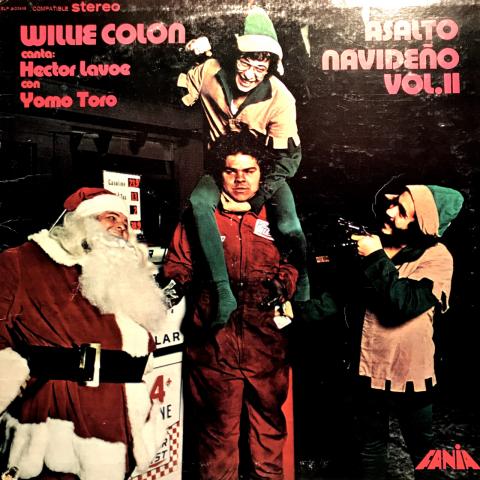 Like posadas, aguinaldos are sung by people who stroll through neighborhoods at night in a tradition comparable to caroling. These groups – also referred to as parrandas and trullas – play a variety of traditional instruments to accompany the aguinaldos, especially light percussion such as panderetas (tambourines), maracas, guiros, and tamboras, along with trumpets, the cuatro and another traditional guitar called a tiple, also used in Puerto Rican country music, or música jibara. Unlike posadas, the songs of the parrandas often focus on secular rather than religious topics, in lyrics of four (coplas) or ten verses (décimas).
Like posadas, aguinaldos are sung by people who stroll through neighborhoods at night in a tradition comparable to caroling. These groups – also referred to as parrandas and trullas – play a variety of traditional instruments to accompany the aguinaldos, especially light percussion such as panderetas (tambourines), maracas, guiros, and tamboras, along with trumpets, the cuatro and another traditional guitar called a tiple, also used in Puerto Rican country music, or música jibara. Unlike posadas, the songs of the parrandas often focus on secular rather than religious topics, in lyrics of four (coplas) or ten verses (décimas).
Countries such as Venezulea, Puerto Rico, and the Philippines have their own variations on the aguinaldo tradition, a folk genre with roots in the medieval villancicos of Spain. Cuba has seen a recent revival of Christmas observance, resurrecting its own musical traditions, including a version of “White Christmas” as a danzón, and “The Little Drummer Boy” as a rumba.
In Puerto Rico, aguinaldos fill the airwaves for almost an entire month, concluding with the Fiesta de Los Reyes Magos (Three Kings Day) on January 6. Following are a sampling of Christmas songs with a tropical twist.
“Si No Me Dan de Beber,” Ramito (Artilleria A-202)
 One of the most popular songs in the aguinaldo repertoire, “Si No Me Dan de Beber” is brimming with the celebratory spirit of the parrandas. The tile, which is mis-spelled on the label, means “If They don’t Give Me Something to Drink,” to which the chorus responds, “I’ll cry” (Lloro). It’s performed by Ramito, born Florencio Morales Ramos (1915 –1989), a Puerto Rican singer considered the king of the island’s jíbaro, or country music, using the rural genre’s trademark nasal tonality.
One of the most popular songs in the aguinaldo repertoire, “Si No Me Dan de Beber” is brimming with the celebratory spirit of the parrandas. The tile, which is mis-spelled on the label, means “If They don’t Give Me Something to Drink,” to which the chorus responds, “I’ll cry” (Lloro). It’s performed by Ramito, born Florencio Morales Ramos (1915 –1989), a Puerto Rican singer considered the king of the island’s jíbaro, or country music, using the rural genre’s trademark nasal tonality.
“Iban Para Belen,” Odilio González (Embassy Records 713-A)
This song, “On Their Way to Bethlehem,” captures the aguinaldo sound par excellence, especially the catchy melody, the prominent plucking of the strings on the cuatro, and the nasal vocals of singer Odilio González, known as El Jibarito de Lares, his hometown.
“Aguinaldo Navidades,” Sexteto Flores (Brunswick 41166)
This 78-rpm recording preserves a more refined, less rowdy version of the aguinaldo, befitting its traditional Nativity theme. The sextet was founded in New York City by Pedro Flores (1894-1979), one of Puerto Rico’s premiere songwriters, famous for compositions such as “Obsesión” and “Bajo Un Palmar,” which are enshrined in the Latin American songbook.
“A Los Reyes Magos,” La Sonora Santanera (Columbia 9565)
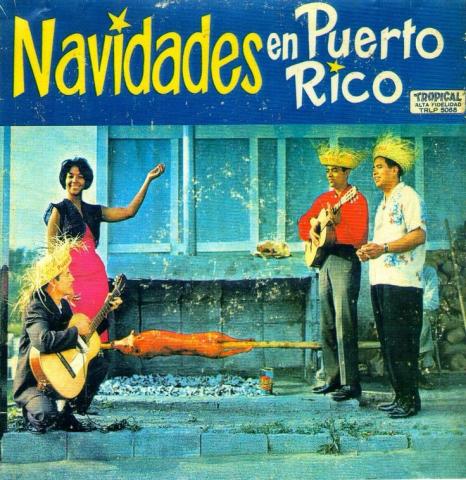 This is one of several songs about the three kings in the Frontera Collection. But it doesn’t mention the guiding star nor exotic gifts. Instead, Mexico’s Sonora Santanera, a legendary tropical dance band, is asking for something special on[AG1] the day of the Epiphany, January 6, when Latin American children traditionally receive gifts. But this request is decidedly adult. The singer wants the three kings of the Orient to bring him a woman who is lovely, affectionate, understanding and who can cook and dance the cha cha cha. Written by Sergio Rivera, the lyric mentions the majesties by name, and rhyming them.
This is one of several songs about the three kings in the Frontera Collection. But it doesn’t mention the guiding star nor exotic gifts. Instead, Mexico’s Sonora Santanera, a legendary tropical dance band, is asking for something special on[AG1] the day of the Epiphany, January 6, when Latin American children traditionally receive gifts. But this request is decidedly adult. The singer wants the three kings of the Orient to bring him a woman who is lovely, affectionate, understanding and who can cook and dance the cha cha cha. Written by Sergio Rivera, the lyric mentions the majesties by name, and rhyming them.
Yo le pido a Melchor que me traiga un amor,
Se lo pido a Gaspar y también a Baltazar
Le pido a Melchor que me traiga un amor,
Y luego a Baltazar, que me haga ir al altar.
Frontera also has a version on Seeco Records by the iconic Cuban dance band, La Sonora Matancera, but without active audio on the site. For a more faithful and reverential take on the story of the three kings, Frontera features an aguinaldo, “Los Tres Reyes Magos,” by Chuito y Natalia, with the former, jibaro singer Chuito el de Cayey, credited as the composer.
“El Cha Cha Cha de la Navidad,” Celia Cruz (Seeco 7947)
A pleasant enough although ultimately disposable Christmas song by the late Queen of Salsa, backed by the band that gave the singer her start in Cuba, La Sonora Matancera. The song is so simple it’s hard to imagine it required three composers to write it. Still, the 78-rpm recording on Seeco Records has historic value as part of Celia’s early repertoire.
“El Burrito Sabanero,” Tropical Playa Suave (Coco Loco CL-807)
Also known as El Burrito de Belén, or the little donkey of Bethlehem, this is one of the most popular Christmas tunes hailing from the Caribbean. The song, about a child riding a donkey on his way to visit the Baby Jesus, is not an aguinaldo but like “Frosty the Snowman,” the song is played constantly throughout the Spanish-speaking world during the holiday season. It was written in 1972 by Hugo Blanco, one of Venezuela’s leading folkloric composers who also wrote “Moliendo Café,” a Latin American standard. The most famous recording of the Christmas song was made in 1976 by a Venezuelan children’s choir, La Rondallita. It became popular worldwide and is still heard every year throughout the U.S. and Latin America. Frontera has only one, unremarkable version, made by this tropical group on a Texas label.
Navidad Means Christmas
The Frontera Collection has dozens of recordings with Navidad, the Spanish word for Christmas, in the title. Here are just a few of the most notable.
“Amarga Navidad,” José Alfredo Jiménez (CBS 5386)
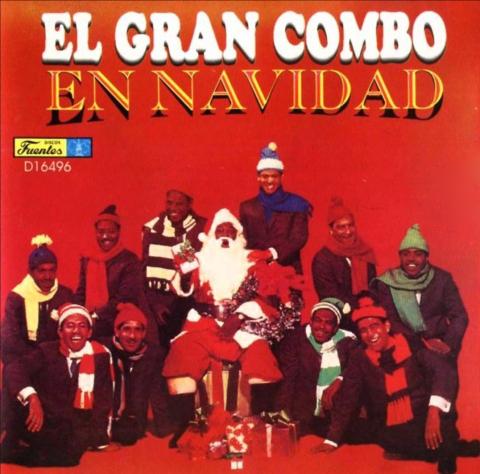 A search of the database shows almost three dozen recordings of this sad Christmas tune, written by Mexico’s leading ranchera composer, José Alfredo Jiménez. The theme of a broken-hearted lover is comparable to Elvis Presley’s “Blue Christmas.” In this case, the singer begs for a quick end to his romantic misery, pleading for a clean Christmas break-up so he doesn’t have to start a new year with the same painful partner. Like so many Jimenez songs, this one has remained a Mexican classic. It’s been recorded by acts as disparate as Los Relampagos del Norte, the seminal Texas norteño band, and El Gran Combo, the great Puerto Rican dance band. In his own version, backed by the Mariachi Nacional de Arcadio Elías, the composer makes up for less-than-perfect vocals with a lot of soul.
A search of the database shows almost three dozen recordings of this sad Christmas tune, written by Mexico’s leading ranchera composer, José Alfredo Jiménez. The theme of a broken-hearted lover is comparable to Elvis Presley’s “Blue Christmas.” In this case, the singer begs for a quick end to his romantic misery, pleading for a clean Christmas break-up so he doesn’t have to start a new year with the same painful partner. Like so many Jimenez songs, this one has remained a Mexican classic. It’s been recorded by acts as disparate as Los Relampagos del Norte, the seminal Texas norteño band, and El Gran Combo, the great Puerto Rican dance band. In his own version, backed by the Mariachi Nacional de Arcadio Elías, the composer makes up for less-than-perfect vocals with a lot of soul.
“Feliz Navidad,” Jose Feliciano (Arcano DKA1-9101-A)
No list of Latin Christmas songs would be complete without Jose Feliciano’s happy anthem. The original by the blind Puerto Rican guitarist ranked No. 5 on a recent Billboard list of the Top 10 most popular holiday songs. However, not all the songs titled “Feliz Navidad” that appear in the Frontera Collection are the same one we’re familiar with; many are completely different tunes. There are a few versions of Feliciano’s ubiquitous hit, by Texas bandleaders Freddie Martinez and Carlos Guzman, for example, and another novelty rendition by Las Ardillitas de Lalo Guerrero. None of them come close to the guitar-driven original by the soulful singer/composer.
“Esta Noche Es Nochebuena,” Lucho Gatica (Capitol F71060)
This solemn song, by Chile’s internationally renowned tenor, is not grist for the commercial, Christmas-carol grinder. It is a slow and delicate number with an almost heavenly touch to Gatica’s vocals. The title uses the Spanish term for Christmas Eve, Nochebuena, which means Good Night, or Holy Night. Fittingly, the hymn-like number conveys some of the spirituality, magic and wonder at the heart of the Christmas celebration. The singer is backed by the excellent orchestra of José Sabre Marroquín. The flip side of the Capitol Records single, recorded in Mexico, features Gatica’s lovely version of “Silent Night” in Spanish, “Noche de Paz,” featuring a background chorus by Argentina’s Los Cuatro Soles.
“Navidad Y Año Nuevo,” Trio Los Panchos (Columbia 9458)
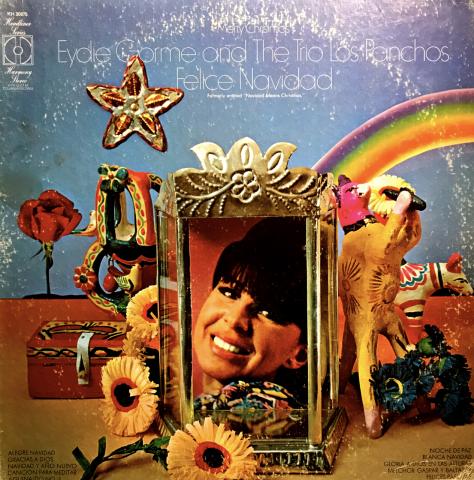 Mexico’s most famous vocal trio from the 1940s and ‘50s offers a gentle seasonal love song which is the polar opposite of a blue Christmas. With a gentle guitar accompaniment, the song hails the arrival of love in time for the new year, almost a retort to José Alfredo’s “bitter Christmas.” Los Panchos also recorded a couple of Christmas albums with pop singer Eydie Gormé, with whom they had established a spectacularly successful collaboration on a series of Latin pop albums in the 1960s. Their Christmas songs, however, are not available in this collection.
Mexico’s most famous vocal trio from the 1940s and ‘50s offers a gentle seasonal love song which is the polar opposite of a blue Christmas. With a gentle guitar accompaniment, the song hails the arrival of love in time for the new year, almost a retort to José Alfredo’s “bitter Christmas.” Los Panchos also recorded a couple of Christmas albums with pop singer Eydie Gormé, with whom they had established a spectacularly successful collaboration on a series of Latin pop albums in the 1960s. Their Christmas songs, however, are not available in this collection.
“Jingle Bells,” Joe Loco and His Trio (Tico 10-153B)
A really fun jazz take on the Christmas classic. Joe Loco, a Puerto Rican pianist who played with Machito among many other New York salsa bands, had a hugely prolific solo recording career in the 1950s and ‘60s. He’s backed by a tasty Latin trio on this cool cover.
“Pancho Claus,” Lalo Guerrero (L & M EP-001)
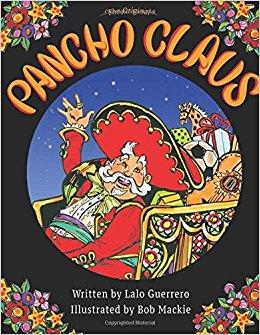 Guerrero’s 1956 parody of “The Night Before Christmas” gives several Mexican-American twists to the classic tale. The scenes include Mama making tamales, Papa dancing the mambo, donkeys replacing reindeer, and Santa substituted by Pancho Claus, “Santa’s cousin from South of the border.” The song has remained so popular it has been turned into a new children’s book, co-authored by the late singer’s son, TV and theater producer Dan Guerrero. At the end, the Mexican Saint Nick leaves his gifts, waves his sombrero and shouts, “Merry Christmas to all, and to all Buenas Noches.”
Guerrero’s 1956 parody of “The Night Before Christmas” gives several Mexican-American twists to the classic tale. The scenes include Mama making tamales, Papa dancing the mambo, donkeys replacing reindeer, and Santa substituted by Pancho Claus, “Santa’s cousin from South of the border.” The song has remained so popular it has been turned into a new children’s book, co-authored by the late singer’s son, TV and theater producer Dan Guerrero. At the end, the Mexican Saint Nick leaves his gifts, waves his sombrero and shouts, “Merry Christmas to all, and to all Buenas Noches.”
--Agustín Gurza
0 Comments
Stay informed on our latest news!
Add your comment